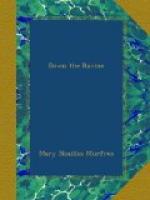“Why—Pig-wigs,” Rufe reiterated obviously.
Then he explained. “He air Nate’s nevy. He air Nate’s oldest brother’s biggest boy,—though he ain’t sizable much. He air ’bout haffen ez big ez me—ef that,” he added reflectively, thinking that even thus divided he had represented Pig-wigs as more massive than the facts justified.
“Ye see,” he continued, “one day when his uncle Tim war over hyar ter the tanyard, I gin him one o’ my game deedies; an’ ez soon ez he got home he showed ’em all that thar deedie—powerful, spryest poultry ye ever see!”
Rufe smiled ecstatically as only a chicken fancier can.
“An’ Pig-wigs war plumb de-stracted fur a deedie too. An’ he run all the way over hyar ter git me ter gin him one. But the deedies hed all gone ter bed, an’ the old hen war hoverin’ of ’em, an’ I didn’t want ter ’sturb ’em,” said Rufe considerately. “So I tole Pig-wigs ter meet me at the tanyard early, an’ I’d fetch him one. An’ ez his granny war goin’ visitin’ her merried daughter, she let him ride behind her on thar sorrel mare ez fur ez the tanyard. So he got hyar ‘fore I did. An’ I kem an’ gin him the deedie.”
Rufe paused abruptly, as if, having narrated this important transaction, he had exhausted the interest of the subject.
Byers was about to speak, but the tanner with a gesture repressed him.
“Ye hain’t tole ‘bout the pit an’ the grant yit, bubby,” he reminded the small boy.
Byers’s display of impatience was not lost upon Rufe, and it added to the general acrimony of their relations.
“Waal,” the small boy began alertly, “we-uns hed the deedie behind the smoke-house thar, an’ I seen him”—Rufe pointed at Byers with disfavor—“a-comin’ powerful slow inter the tanyard, an’ I whispered ter Pig-wigs Griggs ter be quiet, an’ not let him know ez we-uns war thar, ‘kase he war always a-jawin’ at me, ’thout the tanner war by ter keep him off’n me. So we-uns bided thar till he went inter the smoke-house. An’ then ez we-uns kem by the shed, Pig-wigs seen his uncle Nate’s coat hangin’ on a peg thar, ‘kase that thar triflin’ Tim hed furgot, an’ lef’ it thar when he went ter see the deedies. An’ Pig-wigs Griggs, he ’lowed he knowed the coat war his uncle Nate’s by the favior of it, an’ he reckoned the paper stickin’ out’n the pocket war the grant he hed hearn Nate talkin’ ‘bout. An’ I whispered ter him ez he hed better ondertake ter tote it home ter Nate. An’ Pig-wigs said he couldn’t tote the coat, bein’ so lumbered up with the deedie. But he would tote the grant in one hand an’ the deedie in t’other. He couldn’t put the deedie in one o’ his pockets, ’kase his mother sews ’em all up, bein’ ez he would kerry sech a passel o’ heavy truck in ’em,—rocks an’ sech, reg’lar bowlders,” added Rufe, with a casual remembrance of the museum in his own pockets. “So Pig-wigs’s mother sewed ’em all up, ’kase she said they war tore out all the time, an’ she seen no sense in a boy hevin’ a lot o’ slits in his clothes ter let in the air slanchwise on him. An’ Pig-wigs ’lowed he’d tote the grant ef I would git it fur him. An’ I did.”




